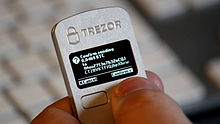wallet
-
Storing Crypto

Now you have some Cryptocurrency! Where can you keep it safe, yet accessible? Holding money in a cryptocurrency is not quite the same as keeping your money in a bank account. With crypto there are no banks!
Essentially all your money is now a very long number that represents an address known as a wallet. This wallet may be on an exchange or other trading platform, as a software wallet online, on a PC or even a mobile application. Another option is a hardware based wallet, similar to a pen drive, that is not permanently connected to the internet, also known as a cold wallet or cold storage. The wallet stores the private and public keys that are needed to interact with the blockchain in which your cryptocurrency is stored.
It is important to note that whatever wallet you are using it does not physically store your Bitcoin, or other cryptocurrency. The wallet gives you access to the blockchain where it is stored as transactions, so if you are using a PC based software wallet and your hard drive crashes, or you lose a hardware wallet like the Ledger Nano, it does not mean you have lost the crypto. There will be a recovery phrase, also known as the seed phrase, (usually a series of unrelated words) that can be used to restore your access to the crypto stored on the blockchain. Along with the actual public and private keys, the recovery phrase is the most important information, so back it up securely, and write it down somewhere safe. If you lose it then you may lose all your funds, and if anyone else gets hols of it then they can access your funds.
It is reported that there are almost 32 million Bitcoin wallets current at the moment. One user can of course have any number of wallets associated or owned by them, through exchanges, software wallets, any applications that use Bitcoin, or as hardware wallets.
A good place to start assessing the range of cryptocurrency wallets available is bitcoin.org where there is a select list of wallets primarily for Bitcoin. See the list at Choose your Bitcoin wallet. Note that this isn't the official Bitcoin website - there is none! Bitcoin, its blockchain and network are not owned by anyone one individual, business, government or other entity.
A term that may be used to describe Bitcoin wallets is SegWit, which in short is the latest technology to make transactions faster, and reduces the fees. So SegWit is something that you should look for in a wallet.
Online Crypto Storage
Online cryptocurrency wallets are those based on a remote server or cloud, that are accessible via the internet using a web browser. They store your private keys and are hosted by a third party. While being very convenient they are less secure than other wallets. They are ideal for storing cryptocurrency that you are intending to use to make purchases on a day to day basis, but not as a store for large amounts.
PC Software Crypto Storage
A software wallet on a PC, Mac, or laptop is more secure than online storage, but is still vulnerable if your computer is hacked. Be careful not to store your private keys or recovery phrase in an easily readable format on the computer if it is connected to the internet.
Mobile App Crypto Storage
Mobile based cryptocurrency wallets are useful for easy access to crypto funds, but may lack some of the features of PC based software wallets. Some wallet apps, such as Button Wallet, are integrating the purchase of crypto directly into the app.
Hardware Crypto Storage
Hardware based crypto wallets, such as the Ledger Nano and Trezor, store your private keys on a small device that can be kept disconnected from the internet until a transfer of funds needs to be made. This is the most secure form of wallet.
One of the best hardware storage devices for cryptocurrency is the Ledger Nano
range.